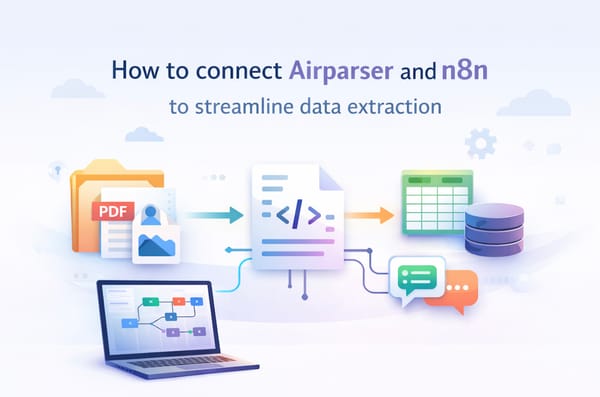Integrating Document Parsing into Your Logistics Management System (LMS)
Maximize your LMS efficiency by integrating document parsing. See how Airparser automates data entry, processing and improves accuracy for logistics operations

Efficient logistics management is crucial for any business that handles shipments, inventory, and orders. A Logistics Management System (LMS) plays a vital role in this process by helping companies track shipments, manage inventory, and process orders. However, to fully optimize your LMS, it's essential to integrate document parsing into your system. By doing so, you can automate data entry, speed up document processing, and improve overall efficiency. In this article, we'll explore how integrating document parsing with your LMS can maximize its effectiveness.
Understanding the Role of an LMS in Logistics
What is an LMS?
A Logistics Management System (LMS) is software designed to help businesses manage their logistics operations. It assists in tracking shipments, managing inventory, processing orders, and ensuring that everything runs smoothly from start to finish. An LMS is the backbone of logistics operations, helping companies streamline their processes and keep track of every detail.
Key Functions of an LMS
An LMS performs several critical functions, including:
- Shipment Tracking: Monitoring the movement of goods from the supplier to the customer.
- Inventory Management: Keeping track of stock levels, orders, and deliveries.
- Order Processing: Handling the receipt, processing, and fulfillment of customer orders.
These functions are essential for efficient logistics operations. However, without document parsing integration, much of the data that feeds into these functions must be entered manually, which can lead to delays and errors.
Challenges Faced Without Document Parsing Integration
Without document parsing integration, logistics companies often face challenges like:
- Manual Data Entry: Employees must manually input data from documents into the LMS, which is time-consuming and prone to errors.
- Processing Delays: Manually processing documents like invoices and shipment notices slows down the entire logistics operation.
- Inaccurate Data: Manual data entry increases the risk of mistakes, leading to issues like incorrect shipments or inventory discrepancies.
These challenges can significantly impact the efficiency of your logistics operations. Integrating document parsing with your LMS can help overcome these issues and improve overall performance.

The Benefits of Integrating Document Parsing with Your LMS
Automation of Data Entry
One of the most significant benefits of integrating document parsing with your LMS is the automation of data entry. With tools like Airparser, you can automatically extract data from documents and input it directly into your LMS. This eliminates the need for manual data entry, reducing errors and freeing up your staff to focus on more critical tasks.
Faster Document Processing
By automating the extraction and entry of data, document parsing integration speeds up the processing of documents like invoices, shipment notices, and customs forms. This ensures that your LMS is always up-to-date with the latest information, allowing for quicker decision-making and more efficient operations.
Improved Data Accuracy
Automated document parsing improves the accuracy of the data entered into your LMS. Tools like Airparser can handle various document types and layouts, including handwritten notes, ensuring that all relevant information is captured accurately. This reduces the risk of errors that can occur with manual data entry and helps maintain the integrity of your logistics data.
For more insights on the benefits of automated document processing, check out our article on Simplifying Logistics Operations with Automated Document Parsing.
Real-Time Data Updates
Integrating document parsing with your LMS allows for real-time updates. As soon as a document is received, the system can automatically extract the necessary data and update the LMS. This ensures that all data is current and reliable, helping your logistics team make informed decisions and respond quickly to changes.
How to Integrate Document Parsing with Your LMS
Choosing the Right Document Parsing Tool
The first step in integrating document parsing with your LMS is choosing the right tool. Look for a solution like Airparser that can handle various document types, including invoices, shipment notices, and handwritten notes. Airparser's advanced GPT-powered parser can adapt to different document layouts and export parsed data to over 6,000 apps thanks to its integration with Zapier and Make.
Steps for Integration
- Define Your Document Types: Identify the types of documents you process regularly, such as invoices, shipment notices, or customs forms.
- Set Up Parsing Rules: Use Airparser to create custom parsing rules for each document type. This ensures that the right data is extracted and entered into your LMS.
- Integrate with Your LMS: Connect Airparser to your LMS using its API, webhooks, or integration platforms like Zapier and Make. This enables seamless data flow between the document parser and your LMS.
- Test and Optimize: After setting up the integration, test the system to ensure it works as expected. Make any necessary adjustments to optimize performance.
Common Integration Challenges and Solutions
When integrating document parsing with your LMS, you may encounter challenges like:
- Handling Unstructured Documents: Some documents may not follow a standard format, making them difficult to parse. Airparser’s AI-driven parsing can adapt to different layouts and even handle handwritten notes, ensuring that all relevant data is captured.
- Ensuring Data Security: Data security is a top priority in logistics. Ensure that your document parsing tool complies with data protection regulations and offers secure data transfer methods, such as encryption.
For more detailed guidance on setting up an automated document parsing system, visit our article on How to Automate Document Classification and Parsing in Logistics.
Real-World Examples of Successful Integration
Case Study 1: Streamlining Invoice Processing
A logistics company that integrated Airparser with their LMS was able to automate invoice processing entirely. The system extracted key information like invoice numbers, dates, and amounts and entered it directly into the LMS. This reduced processing time by 70% and eliminated data entry errors.
Case Study 2: Enhancing Shipment Tracking
Another company used Airparser to automatically extract shipment details from various documents and update their LMS in real-time. This allowed them to track shipments more accurately and provide customers with up-to-date information.
Case Study 3: Optimizing Customs Documentation
A third company integrated document parsing to handle complex customs documentation. Airparser’s ability to parse different document formats and layouts ensured that all required information was captured and processed correctly, reducing delays at customs.
Why Airparser is the Ideal Choice for LMS Integration
Key Features of Airparser
Airparser offers several features that make it an excellent choice for integrating with your LMS:
- Custom Schema Creation: Define how documents are parsed to ensure that the right data is extracted.
- AI-Driven Parsing: Handle various document types and layouts, including handwritten notes.
- Scalability: Easily scale as your business grows, handling more documents without compromising performance.
Ease of Integration
Airparser’s flexibility and compatibility make it easy to integrate with any LMS. Whether you’re using an off-the-shelf LMS or a custom-built solution, Airparser can connect seamlessly via API, webhooks, or integration platforms like Zapier and Make.
Conclusion
Integrating document parsing with your LMS is a powerful way to maximize efficiency in your logistics operations. By automating data entry, speeding up document processing, and improving data accuracy, you can ensure that your LMS is working at its best. Airparser offers the tools and features you need to make this integration seamless and effective.
If you're ready to take your logistics operations to the next level, consider integrating Airparser with your LMS. With its advanced capabilities and ease of use, Airparser can help you streamline your processes and achieve greater efficiency.
For more information on how Airparser can benefit your logistics operations, visit our blog or contact us directly.




